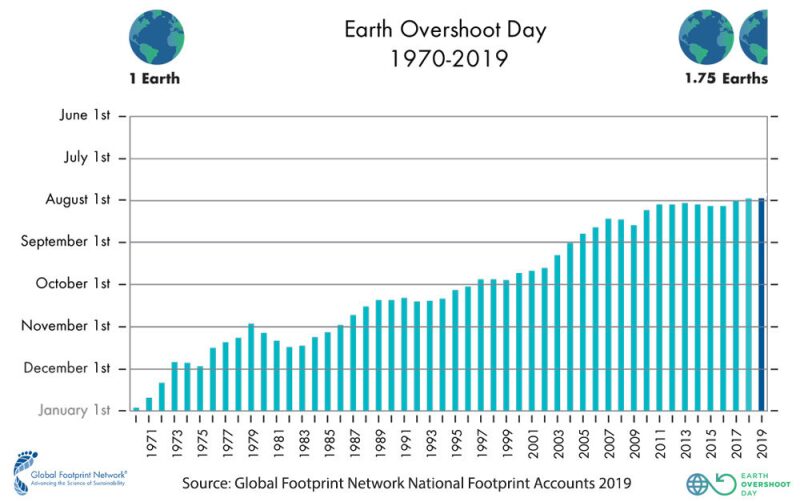On Earth Overshoot Day, humanity will have used nature’s resource budget for the entire year, according to the Global Footprint Network, an international sustainability organization. Earth Overshoot Day has moved up 2 months over the past 20 years to 29 July this year, its earliest date ever.

Earth Overshoot Day landing on 29 July means that humanity is currently using nature 1.75 times faster than the planet’s ecosystems can regenerate. This is akin to using 1.75 Earths. The costs of global ecological overspending are increasingly evident in the form of deforestation, soil erosion, biodiversity loss, and the buildup of CO2 in the atmosphere. The latter leads to climate change and increased extreme-weather events.
“We only have one Earth,” said Mathis Wackernagel, founder of the Global Footprint Network. “This is the ultimate defining context for human existence. We can’t use 1.75 without destructive consequences.”
Wackernagel’s upcoming book, Ecological Footprint: Managing Our Biocapacity Budget, demonstrates that overshoot can only be temporary. Humanity eventually will have to operate within the means of Earth’s ecological resources, whether by disaster or by design.
#MoveTheDate
If efforts to move the date back 5 days each year are successful, humanity could reach one-planet compatibility before 2050. Just days ahead of this year’s Earth Overshoot Day, the Global Footprint Network launched a beta version of a Move the Date Solutions Map, which invites people to champion existing solutions. Users can connect with each other geographically and by focus area, accelerating the implementation of new projects. Developed with startup Mapotic, the social platform also features solutions identified by partners, starting with Buckminster Fuller Challenge award laureates.
The map is designed to complement the Footprint Calculator, which enables people to calculate their own ecological footprint and personal Earth Overrun Date. The calculator draws more than 2.5 million users per year and is available in eight languages.
The relevance of one-planet compatibility for successful business strategies is explored in a whitepaper by Schneider Electric and the Global Footprint Network. Research by both organizations shows that, if 100% of the existing building and industry infrastructure were equipped with available efficiency and renewable energy technologies, the Earth Overshoot Date would move by 21 days.

